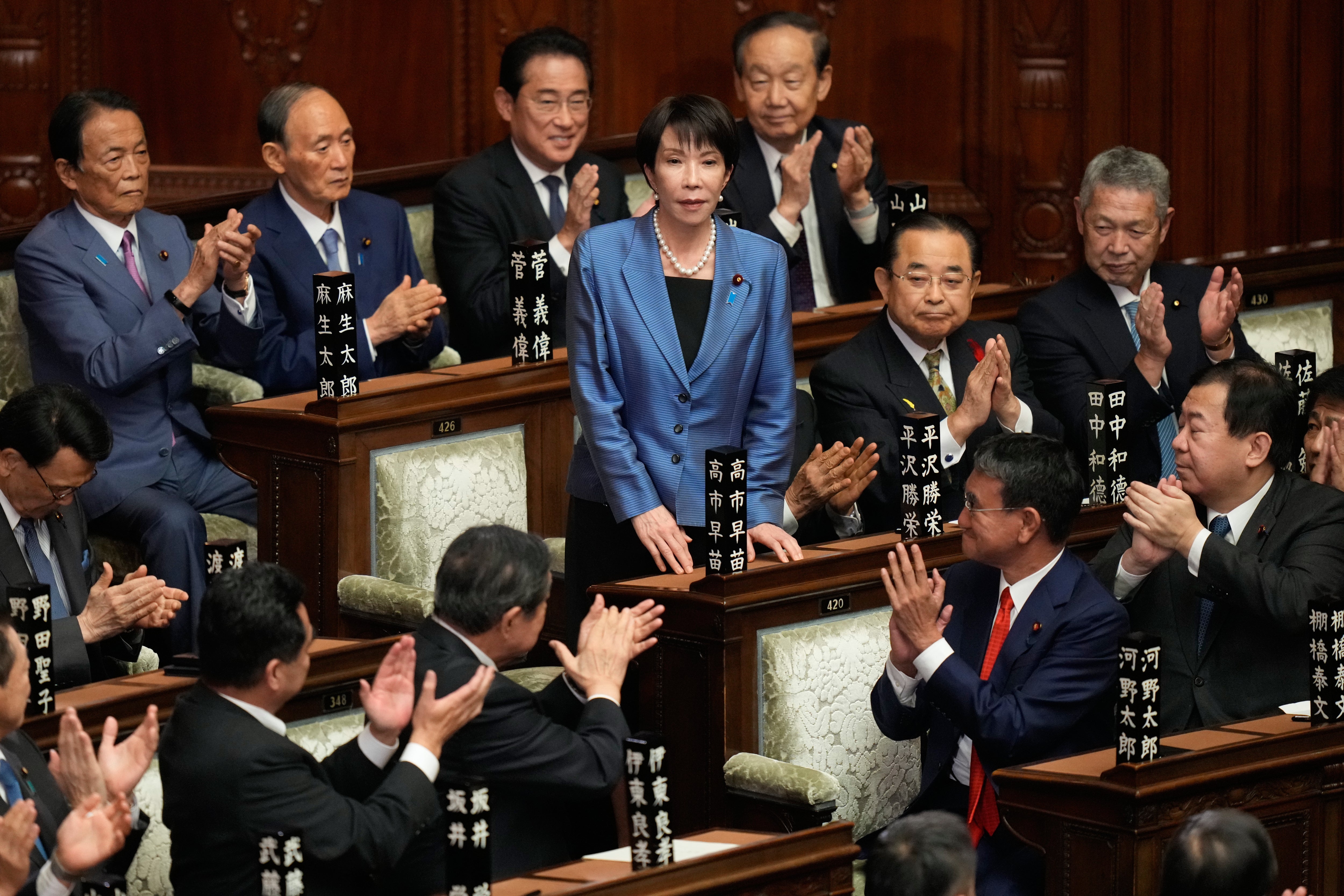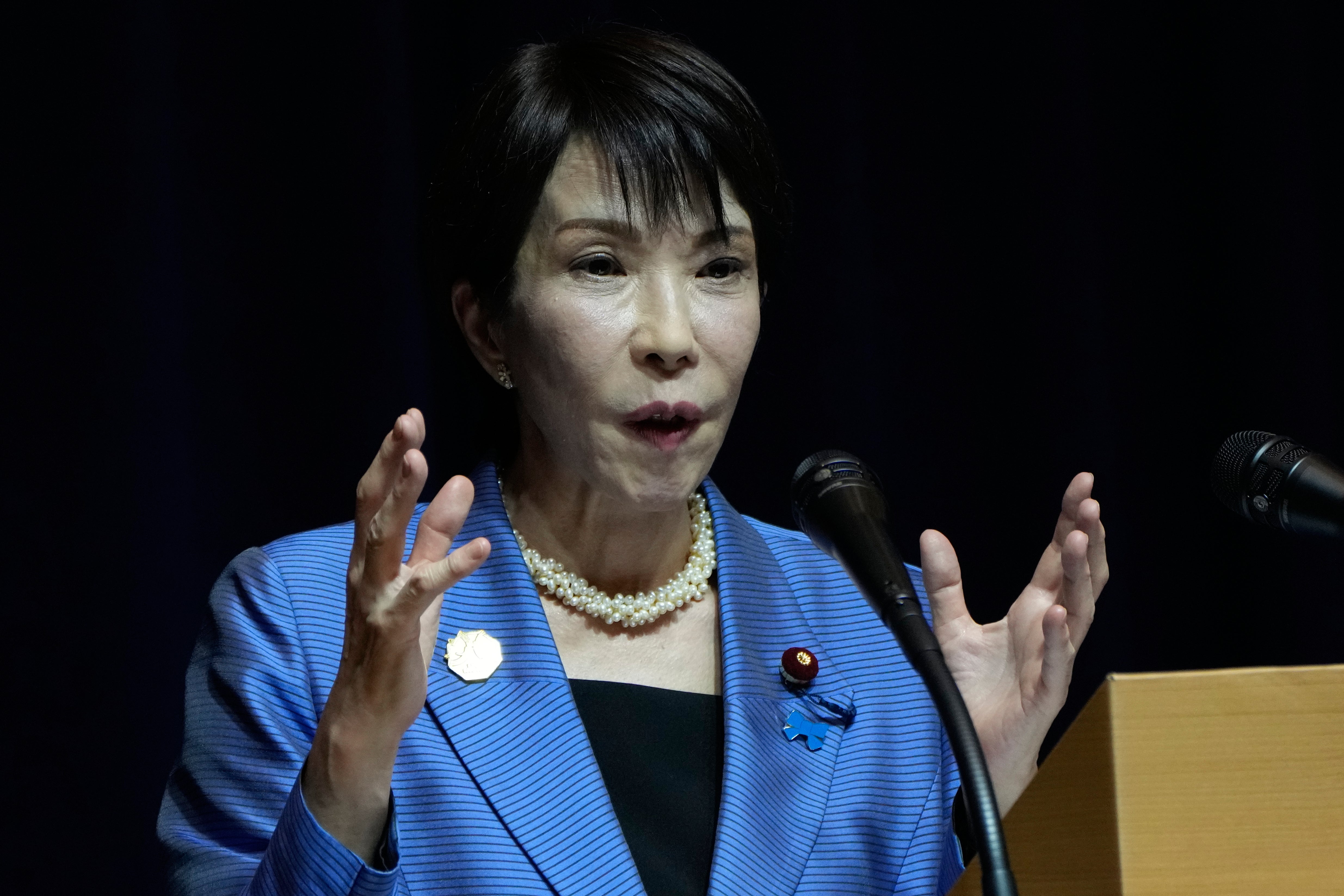Japan’s new prime minister Sanae Takaichi has stirred up a diplomatic storm with Beijing after suggesting that Japan’s self-defence forces could be mobilised if a Chinese attack on self-governed Taiwan threatened Japan’s survival.
Her comments, made during a parliamentary session last week, marked a sharp break from Tokyo’s long-standing policy of “strategic ambiguity” over Taiwan – a stance designed to deter conflict without directly provoking China.
She said that if an emergency in Taiwan involved “warships and the use of force, then that could constitute a situation threatening [Japan’s] survival, whichever way you look at it”.
She added: “The so-called Taiwan contingency has become so serious that we have to anticipate a worst-case scenario.”
“If there are battleships and the use of force, no matter how you think about it, it could constitute a survival-threatening situation,” Ms Takaichi said, referencing the legal threshold under Japan’s 2015 security legislation that allows military action in defence of allies when Japan’s own security is deemed at risk.
Beijing quickly condemned her remarks as “egregious”, with Xue Jian, China’s consul general in Osaka, amplifying tensions by writing on X that “the dirty head that sticks itself in must be cut off”.
Mr Xue also condemned earlier comments by former prime minister Shinzo Abe and other Japanese lawmakers, asserting that “a Taiwan emergency is a Japan emergency”, calling them a “blatant interference in China’s internal affairs and a violation of its sovereignty”, and demanding that Tokyo issue a retraction and apology.
The post, widely interpreted as a threat, was deleted soon after Tokyo lodged a formal protest, with Japan’s chief cabinet secretary Minoru Kihara calling the message “highly inappropriate”.
Officials in Taipei expressed alarm at the threatening tone of Chinese diplomats, and the US ambassador to Japan, George Glass, condemned Mr Xue’s remarks. Mr Glass wrote on X: “The mask slips – again,” and stated that Mr Xue’s words “threatened” the Japanese prime minister and the Japanese people.

Despite the uproar, Ms Takaichi has refused to retract her statement, insisting it aligns with Japan’s official position while acknowledging she would exercise caution when discussing security scenarios in the future.
On Monday, she noted that she had “no intention” of changing the government’s official position.
“I gave a somewhat concrete answer while considering the worst-case scenario,” Ms Takaichi said. “From now on, I’ll refrain from making explicit statements on specific scenarios.”
Beijing regards Taiwan as a breakaway province that must eventually be brought under its control – by force if needed – and has stepped up military pressure around the island since president William Lai Ching-te assumed office.
Although most nations, including the US, do not formally recognise Taiwan as a sovereign country, Washington remains its key supporter, pledging to help the island defend itself and warning China against any military aggression.

Experts believe that Ms Takaichi’s assertive tone underscores a more hawkish turn in Japanese politics under her leadership, one that echoes the hardline foreign policy of her late mentor, Shinzo Abe.
The dispute has rekindled deep historical and geopolitical tensions between Japan and China, rooted in wartime animosity and competing visions for regional dominance.
It also underscores the growing volatility surrounding Taiwan.
While Tokyo’s constitution restricts the use of force, a 2015 reinterpretation allows “collective self-defence” alongside allies like the US in the event of an existential threat.
China’s foreign ministry accused Ms Takaichi of “gross interference in China’s internal affairs”.
“Taiwan is China’s Taiwan,” ministry spokesperson Lin Jian said on Monday, adding that China would not “tolerate any foreign interference” on the matter.
“What signal is the Japanese leader trying to send to ‘Taiwan independence’ separatist forces?” he added. “Is Japan up to challenge China’s core interests and stop its reunification?”
The latest flare-up also followed Beijing’s earlier outrage over Ms Takaichi’s meeting with a senior Taiwanese adviser during the Apec summit in South Korea, an encounter China branded as a violation of its “one-China principle”.
Earlier this month, US president Donald Trump claimed Chinese president Xi Jinping had assured him that Beijing would not take any action towards Taiwan while the Republican president remained in office. But Mr Trump refused to directly answer whether the US would defend Taiwan if it were attacked by China.
Thailand approves extradition of alleged cybercrime kingpin to China
The ‘monkey-chasing squad’ trying to stop macaques from invading homes
Shocking moment 758-metre bridge collapses in China just months after reopening
Japan to help put up protective fences around open-air baths as bear attacks spike
Tatsuya Nakadai death: Legendary Japanese actor and Kurosawa collaborator dies at 92
Tsunami warning issued after powerful quake strikes off coast of Japan







